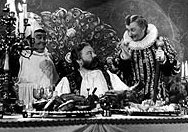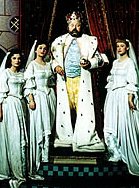 |
Vol 0, No 13
21 December 1998 |
|
|
|
As Camp As Christmas Borivoj Zeman's Byl jednou jeden kral Andrew James Horton Christmas in England and the Czech Republic could not be much more different. The Czechs have the 24th as their Christmas day, whilst the English are quite conceivably at work or out shopping on that day. The English eat turkey and the Czechs have carp. What's more, while the English sit back bloated on Boxing Day to watch The Sound of Music (1965), the Czechs will be certainly not be. The Sound of Music is not a particularly well-known phenomenon in the Czech Republic and Julie Andrews' dulcet tones are unfamiliar to Czech ears. "How can they survive without The Sound of Music?" I hear the distraught voices of Anglo-American connoisseurs of Yuletide high camp asking. Simple, they have there own cheesy home-grown perennial Christmas films, of which Borivoj Zeman's Byl jednou jeden kral (Once Upon a Time There Was a King, 1954) is one. Zeman's film is not directly analogous to The Sound of Music, which was directed by one Robert Wise. For a start, Wise's film is chocker with great Rodgers and Hammerstein tunes to sing along with, whereas Byl jednou jeden kral on the other hand, has only a couple of ditties and they are nothing next to anything that our Julie can belt out. However, there are a number of things about Byl jednou jeden kral that make it more interesting than what Wise has to offer us. The film, as its title suggests, is set in olden times. The age of beautiful princesses, gawky princes in armour trying to prove their worth and warm-hearted but foolish kings. The film is loosely based on Sul nad zlato (Salt over Gold) a fairy-tale most famously reworked by the Czech author Bozena Nemcova, although she herself is better known for her quintessential story of Czech village life, Babicka (The Grandmother). Czech Lear Zeman's story starts as little more than a hammed up version of Shakespeare's King Lear. The conceited king (played by Jan Werich, who also contributed to the screenplay) asks his three unmarried daughters how much they love him. Zpivanka and Drahomira offer rhapsodic and materially-based comparisons of their love for him. However, Maruska - the film's Cordelia - is not nearly as snooty as her sisters. She wears simple clothes and prefers hanging around in the kitchen with the servants, getting stuck in with the cooking. She says that she loves him as much as salt. It's not so much an act of defiance against the sycophancy of her sisters, but more her genuine heart-felt belief that salt is the most important thing there is and that it is loved and needed by everyone in the world. At this juncture, it might be worth digressing to point out that the Czech diet is, by most standards, lethally high in salt. Indeed, the use of salt in cooking has almost a religious fervour to it, with salt seen, like bread, as a staple of the kitchen of a good stable nuclear family. The suggestion that salt might be bad for you to a Czech, therefore, veers on being an insult to the primacy of the family in everyday life. A lack of salt is so incomprehensible to Czechs that one of their most common phrases analogous to the English concepts of "bland" or "insipid" is "neslany, nemastny", which literally translates as "not salty, not fatty". Back to the plot: enraged by his daughter's comparison of him to something so common, the king not only banishes her from the castle but also seeks to eradicate all the salt in his kingdom. The court are less than impressed at his attempts to impose salt-free cooking on them and his subjects furious at having to hand in all their salt for destruction.
Like all good fairy-tales, the story ends happily. Maruska falls in love with a hunky Czech fisherman and her sisters reject the cynical courtship of three foreign princes to fall for two down-to-earth palace workers. The king comes to recognise his folly and accepts Maruska back and, best of all, salt is officially reinstated on the national diet. This causes a minor dilemma when it is realised that every ounce of salt in the land was tipped into the river, but fortunately the old woman is at hand to save the day. Impressed by the archetypal grandmotherly qualities she represents the king's salt-destroyer-in-chief (named Atakdale - the Czech phrase for "and so on" rolled into one word) had let her keep her supply when she came to hand it in. Moreover, despite being stored in a tiny bowl, it pours out in never-ending quantities. And so they all live happily ever after. Some colour in bleak times Byl jednou jeden kral might at first seem like an unusual candidate to achieve mythic status in Czech popular culture. It has done so for a number of reasons, some of which relate to the era in which the film was produced. In 1955, when the film was released, Communism under Novotny was under full swing and Stalinism was still the order of the day in then Czechoslovakia, despite the death of the Russian dictator himself two years earlier. Byl jednou jeden kral managed to strike a balance that few Communist-era films managed. It appeased the Communist censors, and thus was allowed to be distributed, whilst still providing the audiences with what they wanted. Byl jednou jeden kral was an escape from the dull, harsh exterior of life at that time. The films success may well be tied up with it being in colour, a far cry from the monochrome world of worker's overalls and tower-blocks which was being constructed at the time. There is also a nostalgia for olden times and the film harks back to medieval times when the Czech lands were a force to be reckoned with and certainly not to pushed around by outsiders imposing alien ideologies. Moreover, life in the film, although a series of crazy capers, is comparatively idyllic and rooted in the kind of Czech rusticism that Socialism was eager to destroy in the name of progress. To console the censors, the royalty get a good ribbing: the princes who come to try and marry the princesses are oafish, corrupt and ignorant, the king is a buffoon and Maruska's materialistic sisters are most dislikeably ostentatious. Such caricatures did nothing to dent the enthusiasm of Czech audiences, who saw them not as Communist propaganda but as essential ingredients of any good fairy-tale. The film abounds in interpretations which could be taken different ways by Communists and non-Communists alike. To give just one example, when the princes get dumped in favour of some local talent, the authorities could interpret the action as showing the superiority of the working classes over the parasitic royalty. The general audiences, however, could view it differently, seeing the successful suitors as winning because of their earthy common-sense, a frequent, if not essential, virtue in fairy-tales. Furthermore, they could see the amorous victory as being due to the lucky lads being Czech, as opposed to the princes who represent foreign powers with not entirely friendly intentions. A Czech Obsession Indeed the theme of Czechness runs all the way through Byl jednou jeden kral, although the country is never identified as the Czech lands or any of its other manifestations. Anyone wanting a basic introduction to Czech folk cliches could do worse than to watch this film. Its root in traditional family values makes the film reassuring and heart-warming, which of course makes it ideal Christmas viewing. Perhaps the biggest reason for its success, though, is the importance of the fairy-tale (or pohadka, as it is known) as a genre in Czech Republic. The Czechs take their fairy-tales far more seriously than most and fairy-tales are a far more prominent part of children's reading than in Western Europe. This carries over into film and Nemcova fairy-tales have been the inspiration of several other Czech films, the most recent one dating from 1994. Moreover, Jan Werich and Vlasta Burian are in fact major figures in Czech cultural history. They shot to fame as dadaists and in a post-war climate which was less well suited to the avant garde they became champions of comic and folk genres. Werich's post-war running of the Liberated Theatre had an influence on Vaclav Havel, who at the time worked there as a youthful stage hand and Werich is noted as a writer and raconteur, as much as he is as an actor. In Prague you can even visit the Jan Werich museum. Perhaps, he would be better known to Anglo-American audiences if he hadn't fallen ill during the filming of the James Bond movie You Only Live Twice, in which he was originally cast to play the archetypal baddie, Blofeld. Byl jednou jeden kral has, therefore, remained close to the hearts of Czechs. A contemporary poll - at the Czech Movie Heaven website, which allows surfers to cast their vote on hundreds of Czech films - records a whopping 9/10 rating for Byl jednou jeden kral, higher than more-internationally famous Czech classics, such as Ostre sledovane vlaky (Closely Observed Trains, 1966) and Hori, ma panenko (The Firemen's Ball, 1967). So, if you're a Julie Andrews fan caught in the Czech Republic over Christmas, you could be better off trying out Byl jednou jeden kral, putting an extra helping of salt on your carp, forgetting about "My Favourite Things" and enjoying what it means to be Czech. Happy Christmas! Andrew James Horton, 21 December 1998
|
|
![]()
Copyright © 2000 - Central Europe Review and Internet servis, a.s.
All Rights
Reserved
All Rights
Reserved

